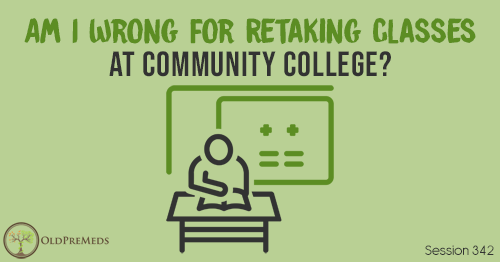Apple Podcasts | Google Podcasts
Session 25
In today’s episode, Ryan and Rich take a question pulled out directly from the forums over at OldPreMeds.org as they discuss getting a master’s program versus postbac program.
OldPreMeds Question of the Week:
Poster, Megan, is a 27-year old professional with accumulative undergrad GPA of 3.04; currently enrolled in a master’s degree program in molecular biology and biochemistry. She is now wondering if she should stop her master’s degree program and go back and do more postbac work to help erase some of her other previous grades. Should she drop out of her master’s program and go back and do undergrad classes for postbac?
Here are the insights from Ryan & Rich:
Go to AMCAS and AACOMAS to do grade conversions and get an idea of what you’re year by year grade in science versus nonscience and get an idea of what your grade trends are.
Master’s programs are tricky in that their GPAs will not directly enhance a weak undergraduate GPA. They also have a reputation of awarding grades surely high for most graduate programs.
Postbacs and SMPs designed specifically for a premed have more traction. If you’re doing it part-time while working full-time, this is not something you can finish a year and go back and do something else.
This all depends on what your undergraduate record looks like and what paths you may want to go, whether you need to do grade replacement and focus on a DO route, or have some good upward grade trends that can be salvageable for MD route or how far along are you from the master’s to prevent the motivation and commitment question that will come out in some ad com’s eyes.
Major takeaway from this episode:
A traditional master’s program still is not going to be as acceptable or impactful as a special master’s program or a postbac depending on your background. However, some schools may look at a master’s degree more heavily. Some even use it to replace an undergrad GPA.
Links and Other Resources:
Transcript
Introduction
Dr. Ryan Gray: The Old Premeds Podcast, session number 25.
You’re a nontraditional student entering the medical field on your terms. You may have had some hiccups along the way, or you’re changing careers, you’re now ready to change course and go back and serve others as a physician. This podcast is here to help answer your questions and help educate you on your journey to becoming a physician.
Now this week we have another great question taken directly from the Old Premeds forum over at www.OldPremeds.org. If you don’t yet have an account over there, please go register and get one. It is an amazing community of likeminded premed students, medical students and physicians all helping each other on their nontraditional paths to medicine. Let’s go ahead and jump into today’s question and welcome Rich to the show.
Rich, welcome back.
Richard Levy: Dr. Ryan, how are you doing today?
Forum Question: Master’s Degree Program
Dr. Ryan Gray: I’m doing well, thank you. Alright we have a good question that I know is going to spark some interesting feedback. We’ve had a couple of these questions centered around Master’s programs, and this one is going to be similar. And I’ve had to field some questions, and actually repeat a kind of podcast on one of them as well. So it will be interesting how we answer this one. So this question, again taken directly from the Old Premeds forum over at www.OldPremeds.org, is Megan who’s a 27 year old professional who had accumulative GPA in her undergraduate years of a 3.04, she says mostly due to not being focused freshman year and overextending herself which is very common. She’s currently enrolled in a Master’s degree program, a molecular biology and biochemistry program, working full time. Looks like her extracurriculars are great; working in the medical field, having some research. She’s under the impression, maybe she got it from us, that maybe a Master’s degree program isn’t the best route, and she’s wondering if she should stop her Master’s degree program and go back and do more postbac work which would help kind of erase some of those other grades if she’s doing a DO- if she’s applying to DO or not. So what do you think about that, Rich? Should she drop out of her Master’s program and go back and do undergraduate classes for a postbac?
Richard Levy: This goes to my rule three, it depends. While Megan has a 3.04, not focused freshman year, we do not know what her grade trends were over all those years in college. So if somebody has a 1.5 freshman year then a 3.2, then a 3.6, then a 3.8, it’s different than it’s going to be if it’s mediocre throughout. So that’s the first step; where do we actually stand with this? She needs to go to AMCAS I suggest, and AACOMAS if she wants, to do their grade conversions and get an idea of what your year by year grade is science versus non-science and get an idea what your grade trends are first of all. Second, Master’s programs are I’ll use the word tricky. Their GPA’s will not directly enhance a weak undergraduate GPA. They also have a reputation of being- rather awarding grades fairly high for most graduate programs. So you get an A, you get a B, that’s always what you’re going to get, that’s what you’re expected to get. So it doesn’t enhance you academically, but of course if you do worse it could hurt you badly. A lot of students previously, let’s go back say a decade or more, would try to get a Master’s in say public health, NPH, which was almost useless and has no science. A lot of people were doing it, it became sort of just something adcoms would look down upon because they were so common. But as we’ve had the development of postbac’s and SMP’s which are designed specifically for premed, those have more traction. So this is a hard science one. We don’t know how traditional or et cetera it may be, and how it’s going to be, what its reputation is, and the student’s already in it. If they drop out, they now have an issue of commitment and non-focusing again, and how does that get explained? So this is where it becomes tricky. But if they’re doing it part time while working full time, this is not something they could finish in a year and go back and do something else. It really depends what her undergraduate record looks like, what path she may want to go. Whether she needs- so badly she needs to do grade replacement and really focus on a DO route. Whether she has some good upward grade trends that maybe salvageable for MD route. And how far along she is in the Master’s to prevent the motivation and commitment question that will come up in some adcoms’ eyes. So this is a difficult question and really depends. Generally though, a traditional Master’s program while better than other ones still is not going to be as acceptable or impactful as a Special Master’s Program or a postbac, depending again on your background. I will just add there are some schools that will look at a Master’s degree more heavily, or weigh it heavily, in fact they may sometimes use it to replace an undergraduate GPA. There are a few formal places that do this, they’re just informal almost rumor level from admissions directors and what they do. It’s not very widespread but there are a few that do seem to do that. For this student though, without looking at what’s going on, I’m not sure I could give her direct advising, but it needs to be looked at before she goes further.
Dr. Ryan Gray: Yeah.
Richard Levy: That’d be my opinion.
Dr. Ryan Gray: It depends.
Richard Levy: Yeah.
Dr. Ryan Gray: I think we should just- like every episode read the question, it depends, and then be done.
Richard Levy: It seems that nuanced, judgment, logical, rational thought sometimes gets lost in the neuroses and paranoia of being a premed. It really does.
Dr. Ryan Gray: Yeah it’s so hard because the assumption is that my situation is unique when it is definitely usually not, but there are so many nuances even though it’s not unique that it still makes it unique.
Richard Levy: Yes.
Dr. Ryan Gray: Was that confusing?
Richard Levy: It’s very confusing. I have this question almost over every topic whenever I look at a forum for people information. I had someone the other day say, “I have a unique transcript question.” I said, “No you don’t.” Sorry, it’s very common. “Should I do A, or should I do B?” That’s it, they just want yes or no. “I can’t give that to you.”
Final Thoughts
Dr. Ryan Gray: It makes it so easy though. Alright so Megan, unfortunately we can’t answer it directly, but I don’t know, there’s a lot that goes into it, hopefully we gave you some good information to think about as you move forward.
Alright there you have it, again that question taken directly from the Old Premeds forum over at www.OldPremeds.org.
If you’re looking for other great information like this podcast, go check out www.MedEdMedia.com where we are currently hosting the Premed Years Podcast which has been out for over three and a half years as we are recording this specific episode, and we’re soon to launch the MCAT podcast, as well as many other projects that we have in the works. Again that’s www.MedEdMedia.com.
I hope that this podcast episode continues to encourage you on your journey to becoming a physician, I hope that your nontraditional path continues to support you as you try to fulfill your dream of becoming a physician. And as always, I hope you join us next week here at the Old Premeds Podcast.












